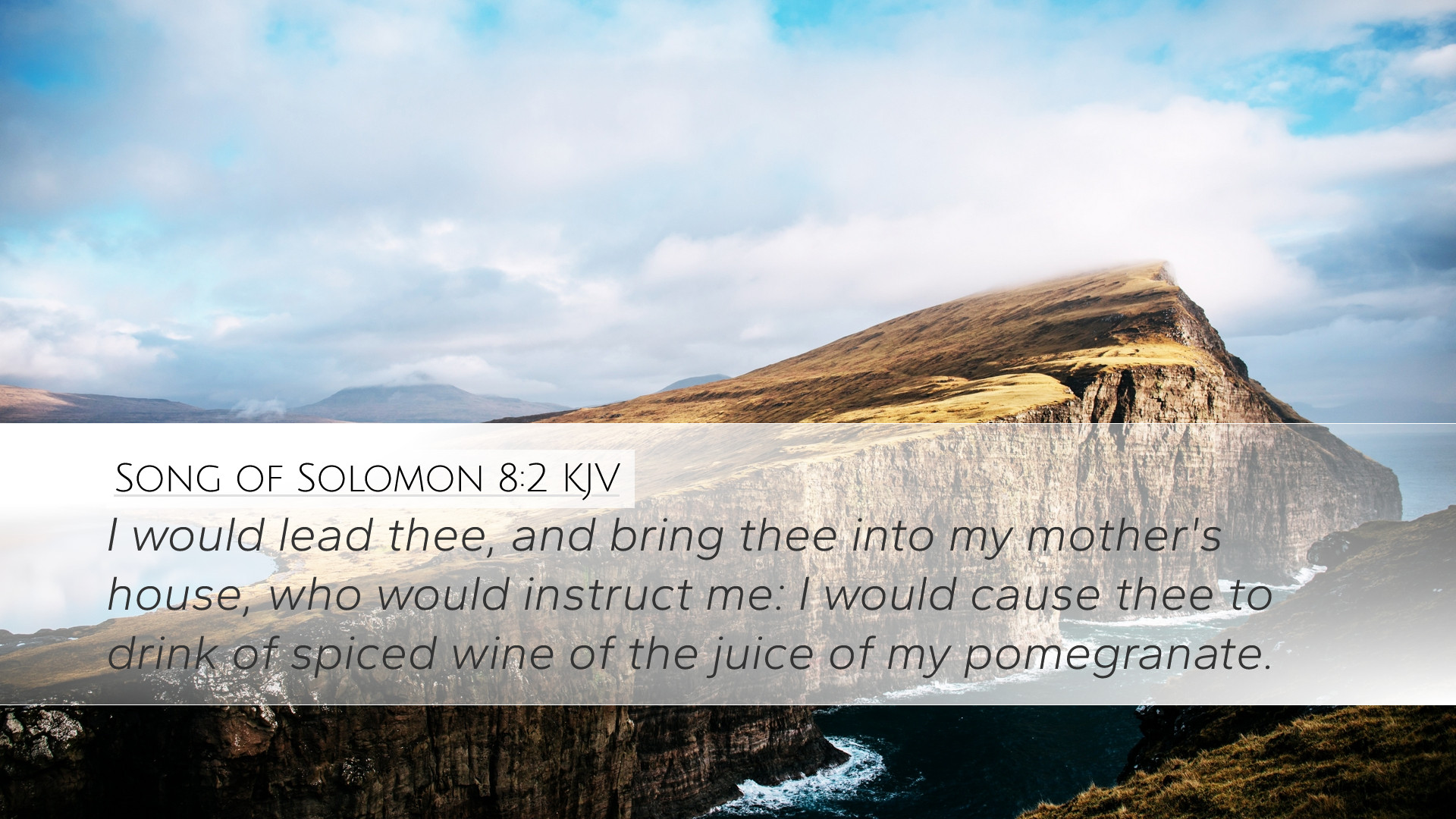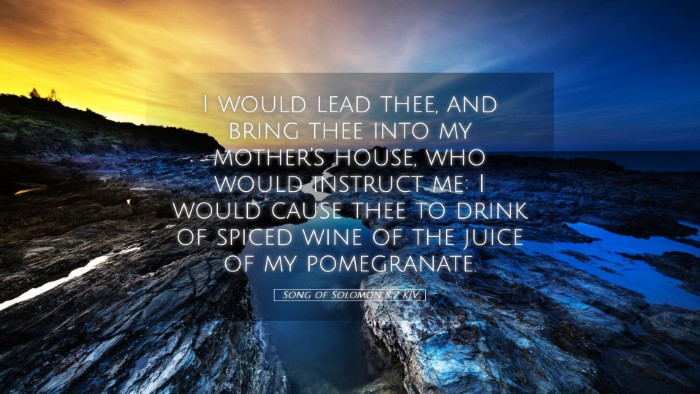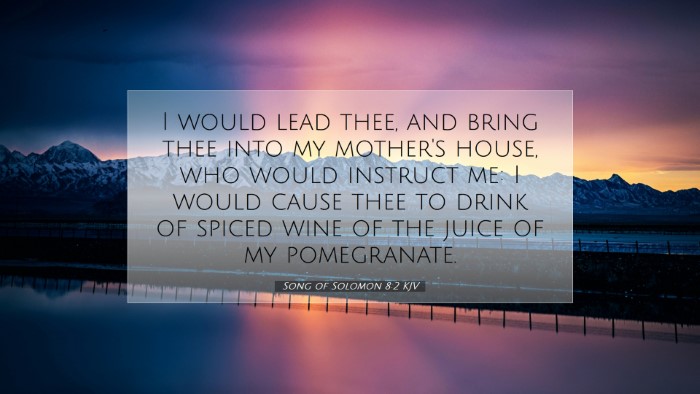Old Testament
Genesis Exodus Leviticus Numbers Deuteronomy Joshua Judges Ruth 1 Samuel 2 Samuel 1 Kings 2 Kings 1 Chronicles 2 Chronicles Ezra Nehemiah Esther Job Psalms Proverbs Ecclesiastes Song of Solomon Isaiah Jeremiah Lamentations Ezekiel Daniel Hosea Joel Amos Obadiah Jonah Micah Nahum Habakkuk Zephaniah Haggai Zechariah MalachiSong of Solomon 8:2
Song of Solomon 8:2 KJV
I would lead thee, and bring thee into my mother's house, who would instruct me: I would cause thee to drink of spiced wine of the juice of my pomegranate.
Song of Solomon 8:2 Bible Commentary
Commentary on Song of Solomon 8:2
Verse: “I would lead thee, and bring thee into my mother’s house, who would instruct me: I would cause thee to drink of spiced wine of the juice of my pomegranate.”
Introduction
The Song of Solomon, also known as the Song of Songs, is a unique poetic book in the Bible, celebrated for its rich imagery and deep exploration of love, desire, and intimacy. Song of Solomon 8:2 encapsulates a passionate expression of longing and love, portraying an invitation to deeper relational communion. Various public domain commentaries provide insights into this profound verse, detailing the cultural, spiritual, and literary dimensions embedded within.
Contextual Analysis
Understanding the context is essential for grasping the full meaning of this verse. The Song of Solomon is traditionally attributed to Solomon, and it presents a dialogue mainly between a bride and her beloved. This particular verse concludes the poem, emphasizing the nurturing aspects of love and desire.
Matthew Henry's Commentary
Matthew Henry highlights the relational dynamics that are evident in this verse. He interprets “my mother’s house” as a symbol of safety and instruction, denoting the intimate setting of familial love and guidance. Henry suggests that the speaker's desire to bring her beloved into this space represents a wish for acceptance and deeper unity. He notes that the mother’s house in this context symbolizes a nurturing environment where love can be cultivated and matured.
Albert Barnes' Commentary
Albert Barnes emphasizes the imagery of “spiced wine” and “juice of my pomegranate,” which signifies abundance and delight. The use of wine in biblical texts often denotes joy, and the reference to pomegranates—symbols of fertility and vitality—reinforces the themes of sensuality and richness in marital relationships. Barnes points out that the speaker’s intention to share these delights reflects an understanding of mutual joy and satisfaction in love.
Adam Clarke's Commentary
Adam Clarke offers insights into the cultural significance of the pomegranate, linking it to the richness of love and the blessings of marital intimacy. He explains that the request to share spiced wine implies a preparation for an enhanced relational experience. Clarke sees the act of leading the beloved into the mother’s house as a metaphor for introducing one another to deeper aspects of their lives, suggesting that true love encompasses knowledge and shared experiences.
Theological Reflections
This verse invites theological reflection on love, intimacy, and community. The desire to introduce a beloved to familial ties reveals an understanding of love that is relationally rich. It embodies the notion that love should be grounded in community and that deeper relationships can bring wealth to the experience of love.
Relational Dynamics
- Intimacy and Vulnerability: The invitation to the mother’s house indicates a willingness to share one’s life fully, suggesting that intimacy requires vulnerability and openness.
- Family as a Foundation: The inclusion of family highlights the importance of community support in relationships, which can shape and sustain love.
Cultural Symbolism
- Pomegranates: Seen as symbols of fertility and abundance, pomegranates in this context suggest that love is not merely physical but richly layered with emotional and spiritual significance.
- Spiced Wine: The reference to wine reflects joyous celebration and the sweetness of love—a theme common in poetic literature.
Conclusion
In summary, Song of Solomon 8:2 is a profound verse that encapsulates the beauty of love and intimacy woven into the fabric of community and familial ties. It encourages believers, pastors, and theologians to consider the holistic nature of love—as not simply a private, individual affair but as an expression that thrives within the context of shared lives, traditions, and familial bonds. Through the insightful contributions of Matthew Henry, Albert Barnes, and Adam Clarke, we gain a multifaceted understanding of this verse, revealing its depth and relevance for contemporary faith communities.


